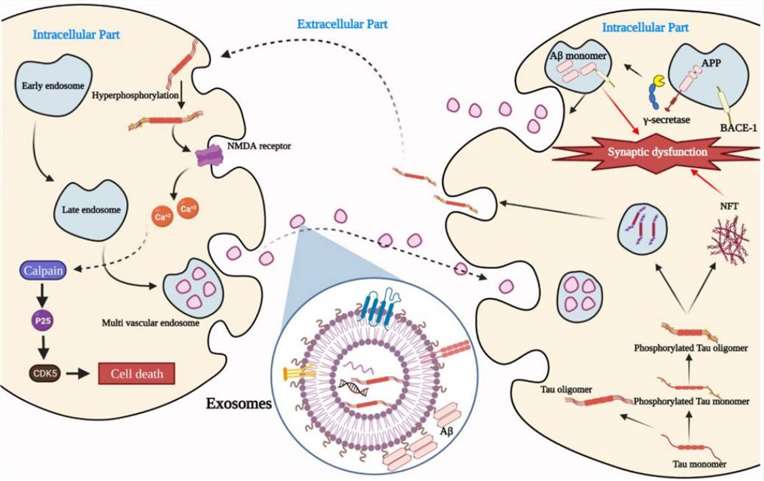Alzheimer's Disease Exosome Research Solution
Online InquiryExosomes, nano-sized extracellular vesicles (EVs) secreted by almost all cell types, are found in biological fluids and central nervous system tissues. Exosomes play an important role in normal cellular functions (e.g. cellular communication) as well as in various pathological conditions, and the fact that their contents change during disease makes them a particularly attractive target for diagnostic approaches. Alzheimer's disease (AD) is one of the most common neurodegenerative diseases. Exosomes have been reported to play multiple roles in AD.
Exosomes in Alzheimer's disease
AD is the most common form of dementia in the elderly, accounting for more than 60% of all memory disorders. AD characterized by increased β-amyloid peptide deposition and hyperphosphorylated tau aggregation in neurofibrillary tangles (NFTs) has become a serious public health problem due to its high rate of disability and its cognitive impairment, which is more severe than aging. The genesis and progression of AD are influenced by both genetic and environmental factors.
Notably, exosomes are involved in the process of AD development and play a multifaceted role in AD. Previous studies have shown that exosomes may facilitate the spread of AD in the brain by carrying pathogenic proteins. They may induce apoptosis of astrocytes, thereby impairing neuronal function during disease progression. On the other hand, exosomes have been reported to be implicated in the pathogenic protein clearance process. Exosomes appear to reduce the deposition of Aβ, one of the two symbolic pathological proteins of AD, in different ways. Moreover, previous studies have suggested that exosomes also help promote neurogenesis and reduce cognitive impairment. Exosomes can restore nerve function by increasing nerve density and inhibiting oxidative stress damage, and specific cellular and molecular mechanisms of exosomes in AD development need to be further investigated.
 Fig. 1 The pathological role of exosomes in AD. (Soliman, Hagar M., et al., 2021)
Fig. 1 The pathological role of exosomes in AD. (Soliman, Hagar M., et al., 2021)
Alzheimer's disease exosome research solution at Creative Proteomics
Creative Proteomics is a leading service provider focused on subcellular and single-cell level research. Our capability can help solve problems in exosome research, from optimal exosome hierarchical separation, enrichment of assay substances, liquid chromatography-mass spectrometry analysis to data processing and analysis, and ultimately obtaining relative relationships between target assay substances and physiological and pathological changes. Based on cutting-edge technology, advanced platforms, and strict analysis workflows, our team of experts can provide customized and comprehensive exosome research services and solutions.
| Exosome analysis services | |
|---|---|
| Exosome isolation and purification | Sucrose gradient centrifugation |
| Polymer-based exosome enrichment method | |
| Immunomagnetic bead method | |
| Size exclusion chromatography method | |
| Exosome identification | Nanoparticle tracking analysis (NTA) |
| Electron microscopy analysis | |
| Western blot | |
| Exosome marker assay | Isolation and enrichment of exosomal CD9, CD63, CD81, TSG101, HSP70 proteins |
| Exosome surface protein identification and quantitative analysis | |
| Exosome engineering | Exosome labeling and tracking |
| Cargo loading | |
| Engineered exosome production | |
| Cargo loading assessment | |
| Exosomes labeling and tracking | Exosome fluorescent labeling |
| Fluorescence exosome purification | |
| Fluorescent exosome concentration labeling | |
| Exosome multiomics analysis | Exosome proteomics analysis: Exosome protein profile identification Exosome protein composition analysis Exosome protein expression level analysis Exosome protein differential expression analysis |
| Exosome metabolomics analysis: Exosome differential metabolite screening Qualitative and quantitative analysis of target metabolites/metabolic pathways | |
| Exosome lipidomics analysis: Exosome lipid composition and level analysis Differential expression analysis of exosomal lipid molecules Qualitative and quantitative analysis of targeted lipid molecules | |
| Exosomal biogenesis and identification | Our capabilities will provide strong support for the study of exosome biogenesis and its identification. |
| Exosomal cargo and loading mechanism | Our services can greatly help the study of exosomal cargo and loading mechanism, facilitating the diagnostic and therapeutic applications of exosomes. |
| Exosome function research | In vitro analysis of the function of exosomes In vivo analysis of the function of exosomes |
Our services can greatly support the following AD exosome research
- Exosomes as a potential vehicle for drug delivery in AD
- Exosomes as biomarkers in AD
- Further research of exosomes in the development and progression of AD
With global aging, AD has become a serious public health problem. However, there is a lack of durable and complete strategies for the treatment of heterogeneous and complex AD. Therefore, approaches to reduce the current AD epidemic are becoming a major focus of human health care. As an important approach to intercellular communication, exosomes provide new perspectives on therapeutic and diagnostic strategies for AD. Thank you for your interest in our services. You can contact us for more about our platform, or any other inquiries. Our customer service representatives are available 24 hours a day from Monday to Sunday.
References
- Malm, Tarja, Sanna Loppi, and Katja M. Kanninen. "Exosomes in Alzheimer's disease." Neurochemistry international 97 (2016): 193-199.
- Guo, Mengtian, et al. "Mesenchymal stem cell-derived exosome: A promising alternative in the therapy of Alzheimer's disease." Alzheimer's Research & Therapy 12.1 (2020): 1-14.
- Soliman, Hagar M., et al. "Exosomes in Alzheimer's disease: from being pathological players to potential diagnostics and therapeutics." International Journal of Molecular Sciences 22.19 (2021): 10794.
* For Research Use Only. Not for use in diagnostic procedures.



